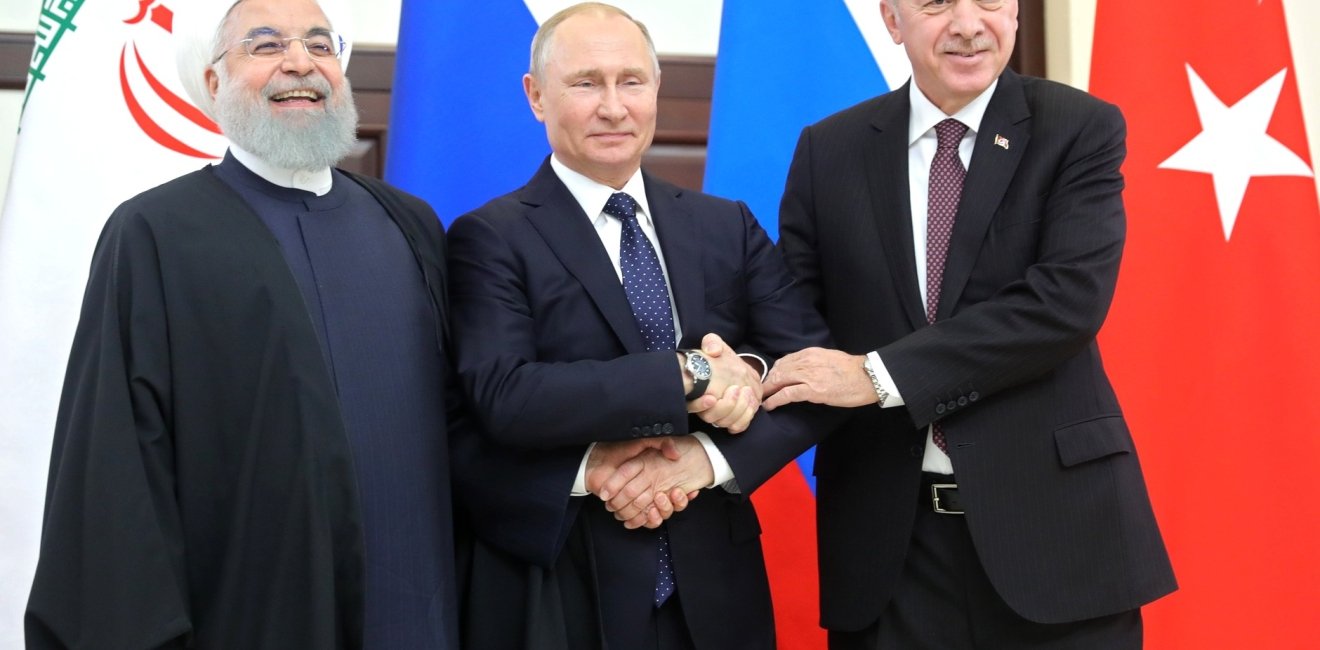
A blog of the Kennan Institute
BY RAHIM RAHIMOV
Russia, Iran, and Turkey moved a step closer to a settlement that would determine the future of a peaceful Syria when the three countries’ leaders met earlier this month in the southern Russian city of Sochi. But an agreement is still out of reach.
The three powers, all of them with a military presence and conflicting interests in what used to be unified Syria, are just beginning to learn how to reconcile their differences in a region where U.S. influence is waning. The political process in Syria could be seen as a small-scale precursor to a world order in which the United States is no longer the dominant caretaker.
Three major issues were on the agenda at the Sochi summit. The first issue represented the continuation of a previously unresolved matter: the fate of Syria’s rebel-controlled Idlib Province. The Kurds want control of the city of Idlib, which would give them access to the Mediterranean Sea. Ankara opposes Kurdish ambitions to gain sea access, claiming the Kurds would use it to construct a “terror corridor,” while Moscow and Tehran want Damascus to regain control of the city. In a September 2018 meeting, the leaders of the three countries failed to reach a consensus on how matters should be handled; Turkey’s push for a cease-fire in the region was rejected by Iran and Russia. In February, the future of the province was once again brought up. The summit declaration signed by the three leaders expressed firm support for the “unity and territorial integrity of the Syrian Arab Republic” and criticized “separatist agendas”— thus rejecting Kurdish ambitions, once again.
A second issue addressed at the conference was forced onto the agenda by Donald Trump’s surprise announcement on December 18, 2018, that U.S. troops would be withdrawn from Syria. Ankara, Moscow, and Tehran cannot agree on which country will fill the gap left by the U.S. troop withdrawal from east of the Euphrates, particularly from Kurdish-controlled areas.
A third major issue taken up at the summit was the makeup of a Syrian constitutional committee, a body that would include the Syrian opposition and would be tasked with creating a new constitution for the country. Replacing the current form of a republic with a federation, for example, would give the Kurds much greater autonomy, a status not favored by Ankara, Damascus, Tehran and Moscow. The composition of the constitutional committee has not been settled; the three leaders, harboring different views, have sought support from different authorities, leading to substantial foot-dragging, while Syria’s president Bashar al-Assad condemns the whole notion of federalization.
Much of the Sochi trio’s inability to reach consensus on geopolitical matters relates to the three countries’ existing alliances. As both a member of NATO and an ally of Russia, Turkey tries to play both Washington and Moscow. A shared enmity toward the United States, on the other hand, compels Moscow and Tehran to seek common ground with Ankara. This may explain why Iranian president Hassan Rouhani modified his earlier stance at the Sochi summit with respect to Turkey’s concerns over security threats originating on its border with Syria, while Russia is prepared to tolerate a longer Turkish presence in Idlib. Yet Turkey justifies its military presence in Syria with fighting the Kurds, whom Ankara regards as terrorists.
In taking up the future of Syria, the three powers must also carefully negotiate with Syrian president Assad. In a speech on February 17, Assad rejected the idea of federalization of Syria, depicting it as “comprehensive decentralization that weakens the state’s authority and marginalizes it, thereby weakening sovereignty, nationalism, and social cohesion, which would lead to social division and ultimately geographic division.”Federalization would mean allowing Kurdish autonomy in Syria and therefore is most favored by the Kurds, who have been backed by the United States. But Russia has also nurtured connections with the Kurds, and political autonomy for the Syrian Kurds would amount to a significant step toward the creation of an independent Kurdish state—not an outcome desired by Moscow.
In a glimpse of a post-U.S. order, the Kurdish forces, the main U.S. ally in the region, are seen as increasingly vulnerable. With both Turkey and Assad’s Syria eager to seize the opportunity and double down on their pressure on the Kurds, Russia seems to be their only hope—and that has limits. As the major powers concerned with the Middle East begin sorting out new alignments, geopolitical strategy is expected to trump the Kurds’ own ambitions, and they will most likely be treated in keeping with political expediency rather than as autonomous actors on the Syrian scene.
Author


Kennan Institute
After more than 50 years as a vital part of the Wilson Center legacy, the Kennan Institute has become an independent think tank. You can find the current website for the Kennan Institute at kennaninstitute.org. Please look for future announcements about partnership activities between the Wilson Center and the Kennan Institute at Wilson Center Press Room. The Kennan Institute is the premier US center for advanced research on Eurasia and the oldest and largest regional program at the Woodrow Wilson International Center for Scholars. The Kennan Institute is committed to improving American understanding of Russia, Ukraine, Central Asia, the South Caucasus, and the surrounding region through research and exchange. Read more

Explore More in The Russia File
Browse The Russia File
Chechnya as a Model of Modern Russia

Russia’s Indigenous Communities and the War in Ukraine

Gas and Power in a Changing US–Russia Relationship

